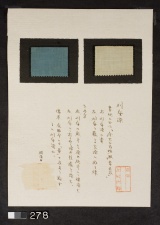Difference between revisions of "Kariyasu (Eulalia) - right (278 R)"
Jump to navigation
Jump to search
(username removed) |
m (MDerrick moved page Kariyasu - right (278 R) to Kariyasu (Eulalia) - right (278 R) without leaving a redirect) |
||
| (2 intermediate revisions by 2 users not shown) | |||
| Line 5: | Line 5: | ||
| 278 | | 278 | ||
|- | |- | ||
| − | ! scope="row"| | + | ! scope="row"|Uemura number / title |
| − | | | + | | ; "Haze-some 25" |
|- | |- | ||
! scope="row"|Folder location | ! scope="row"|Folder location | ||
| Line 21: | Line 21: | ||
|- | |- | ||
! scope="row"|Dyestuff (Japanese common name) | ! scope="row"|Dyestuff (Japanese common name) | ||
| − | | 刈安 : Kariyasu | + | | 刈安 : Kariyasu |
| + | |- | ||
| + | ! scope="row"|Dyestuff (English common name) | ||
| + | | Eulalia | ||
|- | |- | ||
! scope="row"|Dyestuff (botanical name) | ! scope="row"|Dyestuff (botanical name) | ||
| Line 41: | Line 44: | ||
| - | | - | ||
|- | |- | ||
| − | ! scope="row"| | + | ! scope="row"|Uemura's notes |
| − | | In the Nihon shoki ( | + | | In the Nihon shoki () from 720 AD., Japan, it is said "". The yellow recorded in the Ebuku-ryo () from the 8th century. AD, Japan is considered to have been achieved by dyeing with this plant. |
|- | |- | ||
| − | ! scope="row"| | + | ! scope="row"|Uemura's date |
| Kyoto | | Kyoto | ||
|} | |} | ||
| − | [[Category: | + | [[Category:Uemura dye archive]] |
Latest revision as of 08:43, 23 June 2020
| Museum number | 278 |
|---|---|
| Uemura number / title | ; "Haze-some 25" |
| Folder location | 4th shelf |
| Sample location | right (278 R) |
| Fiber type | cotton |
| Color | cream |
| Dyestuff (Japanese common name) | 刈安 : Kariyasu |
| Dyestuff (English common name) | Eulalia |
| Dyestuff (botanical name) | Miscanthus tinctorius (Steud.) Hack. |
| Plant part | leaf / dried (?) |
| Dyestuff extraction | boiled in water |
| Auxiliary agent in dye bath | - |
| Mordant | ash water |
| Other auxiliary agent | - |
| Uemura's notes | In the Nihon shoki () from 720 AD., Japan, it is said "". The yellow recorded in the Ebuku-ryo () from the 8th century. AD, Japan is considered to have been achieved by dyeing with this plant. |
| Uemura's date | Kyoto |
